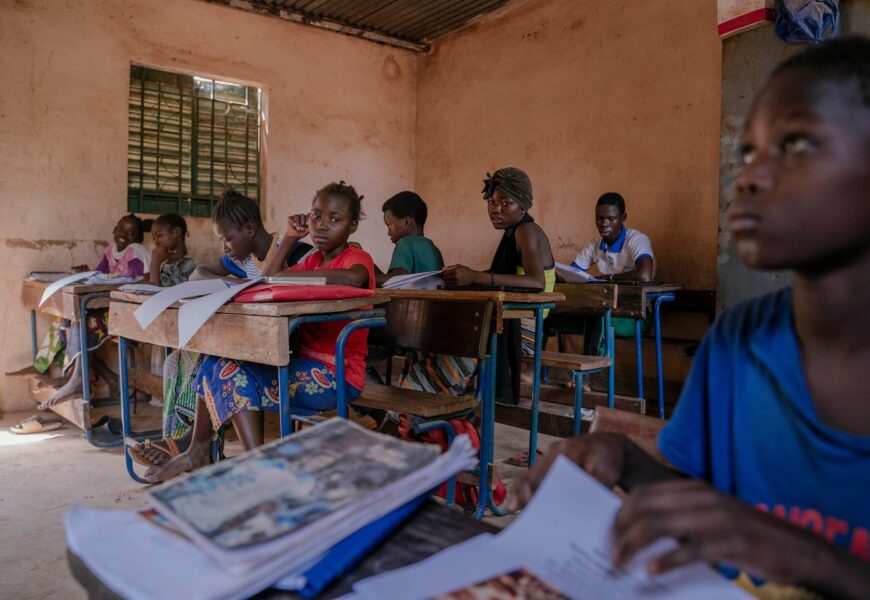SAFO, Mali — Recently, many students had their first encounter with their mother tongue in written form. They enthusiastically stumbled through a book written entirely in Bambara, Mali’s prominent language, joyfully vocalizing the words displayed on the ThinkPad laptops before them.
The twist? The content on their screens was crafted, translated, and illustrated using artificial intelligence.
Amidst mounting tensions in Mali’s relationship with Europe, particularly its former colonial ruler, France, there is a growing initiative to leverage AI in producing children’s books in Bambara and various indigenous languages. Last year, in response to strained social dynamics between the nations, Mali’s government officially designated Bambara and 12 other local languages as the primary languages, while still maintaining the use of French in governmental and educational settings.
Séni Tognine, an Education Ministry employee in Mali assisting RobotsMali in creating e-books, noted a democratic push behind endeavors like Robots Mali’s initiative. This startup has harnessed artificial intelligence to generate over 140 novels in Bambara since its inception last year. Tognine observed a collective desire from both the government and the populace to embrace and promote local languages.
RobotsMali utilizes AI to develop stories that authentically portray the lives and cultures of ordinary Malians. Rather than simply translating a French classic like “Le Petit Prince” into Bambara, the Robots Mali team prompts ChatGPT with queries like “Tell me mischievous things kids do”.
The team, as featured in Rest of World, filters out examples not relevant to Malian children, leveraging Google Translate—which integrated Bambara in 2022 and employs AI for enhanced translations—for the initial translation phase. Experts such as Tognine then refine the content. Subsequently, another team member employs various AI image generators to illustrate the narratives, ensuring the characters are relatable to young Malian readers, followed by the creation of comprehension tests using ChatGPT.
In a classroom in Safo, a group of twelve students, some of whom had never attended public schools, engaged with a story about behaviors children should avoid, such as wasting food, teasing siblings, and disrespecting adults. The teacher guided them through the narrative, prompting individual students to read aloud, fostering a collaborative learning environment.
Ten-year-old Soko Coulibaly, who had never experienced formal schooling and initially felt intimidated by written Bambara, gradually familiarized herself with the language she spoke at home. She highlighted the significance of her mother, among the 70% of Malians who are illiterate.
A Struggle for African Languages
The majority of Africa’s approximately 1,000 languages lack representation on online platforms that major AI systems like ChatGPT rely on for training. For instance, basic inquiries in Ethiopia’s popular languages, Amharic and Tigrinya, often yield a mix of nonsensical responses. However, entrepreneurs like Asmelash Teka Hadgu, who founded a startup specializing in English-Ethiopian language translations using machine learning, view projects like RobotsMali as indicative of AI’s potential in democratizing education access.
Nate Allen, an associate professor at the Africa Center for Strategic Studies in Washington, acknowledges the technological advancements in AI by countries like the United States and China. Nonetheless, initiatives in Mali underscore the increasing accessibility of AI technologies, particularly in education.
Within the Education Ministry, one individual refines Bambara translations from Google Translate, while another explores Playground, an online image creator, for visuals like “An African woman pounding millet.” This collaborative effort within RobotsMali’s workspace in Bamako, led by co-founder Michael Leventhal, highlights the fusion of AI with traditional linguistic practices.
Tognine emphasized the efficiency AI brings to the ministry’s work, streamlining tasks that previously required weeks or months into mere seconds. Despite past challenges in introducing Bambara to public schools, Tognine noted a shifting attitude towards valuing literacy in national languages, spurred by the government’s emphasis on sovereignty and cultural preservation.
Bakari Sahogo, another Education Ministry collaborator with Robots Mali, underscored the cultural and historical enrichment derived from promoting Bambara and local languages, safeguarding and nurturing Mali’s heritage.
Fostering a Rich Literary Legacy
Leventhal, a former tech entrepreneur from Silicon Valley now dedicated to enhancing Bambara’s written tradition in Mali, envisions AI as a catalyst for strengthening the language’s literary heritage. He anticipates that increased language data accessibility will facilitate this evolution.
Initiatives like the one in Safo, where participants significantly improved their reading skills under RobotsMali’s nine-week program, exemplify the program’s impact. Despite funding constraints halting the program’s continuation, the children’s newfound enthusiasm for learning reflects the potential of AI in education.
Bourama Diallo, previously anxious in a French-only school, now finds joy in learning, echoing the sentiment of many participants. Coulibaly, the 10-year-old student, eagerly shared her fondness for books about animals in Bambara and expressed hope for the program’s revival.
As Leventhal plans to resume the program upon securing funding, he remains committed to empowering children through literacy. Coulibaly, once captivated by the magic of computer-generated stories, encapsulated the program’s essence by acknowledging the vast possibilities enabled by technology.










